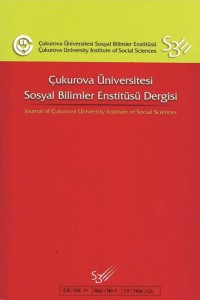Öz
Bu
araştırmayı doğuran güdü, örgütsel erdemlilik konusu üzerine yapılmış
çalışmalarda oluşan bilgi birikiminin sistemli bir şekilde ortaya konulma arzusudur.
Bu amaçla örgütsel erdemlilik konusunda yerli/ yabancı literatürde yayımlanan
akademik makalelerin bibliyometrik bir içerik analizi ve atıf analizi
gerçekleştirilmiştir. Araştırma kapsamında 1982-2018 yılları arasında yerli/yabancı
literatürde yayınlanmış ve ulaşılabilen 72 kavramsal çalışma ve araştırma
makalesi incelenmiştir. Yapılan bibliyometrik analiz sonucunda makalelerin
özellikleri (yazar, yıl, yayınlandığı dergi, örneklem, örnek sayısı, ölçekler,
ölçek boyutları, erdem/örgütsel erdem tanımları, erdem tasnifine yer verilen
filozoflar, değişkenler arası ilişkiler), en fazla atıf alan 10 makale ve
içerik analizi ile en sık kullanılan anahtar kelimeler incelenmiştir. Örgütsel
erdemlilik kavramı ile birlikte en fazla çalışılan konular mutluluk/iyilik
hali, etik, örgütsel adalet, liderlik tarzları, kişilik, bireysel/örgütsel
performans, örgütsel bağlılık, işe tutukunluk ve yaratıcılık olmuştur.
Anahtar Kelimeler
örgütsel erdemlilik erdemli örgütler bibliyometrik analiz atıf analizi
Kaynakça
- Alzola, M. (2008). Character and environment: The status of virtues in organizations. Journal of Business Ethics, 78(3), 343-357.
- Baumeister, R. F., & Juola Exline, J. (1999). Virtue, personality, and social relations: Self‐control as the moral muscle. Journal of Personality, 67(6), 1165-1194.
- Bayram, Ö. G. (1998). Atıf verisi (Citation data) ve enformetrik yasalar: Türk kütüphanecilik literatüründeki doktora tezleri üzerinde bir uygulama. Türk Kütüphaneciliği. 12 (1), 21-32.
- Bright, D. S., Cameron, K. S., & Caza, A. (2006). The amplifying and buffering effects of virtuousness in downsized organizations. Journal of Business Ethics, 64(3), 249-269.
- Cameron, K. (2010). Five keys to flourishing in trying times. Leader to Leader, 2010(55), 45-51.
- Cameron, K. S. (2003). Organizational Virtuousness and Performance,[in:] Positive Organizational Scholarship. Foundations of a New Discipline, KS Cameron, JE Dutton, RE Quinn.
- Cameron, K. S., Bright, D., & Caza, A. (2004). Exploring the relationships between organizational virtuousness and performance. American Behavioral Scientist, 47(6), 766-790.
- Chun, R. (2005). Ethical character and virtue of organizations: An empirical assessment and strategic implications. Journal of Business Ethics, 57(3), 269-284.
- Chun, R. (2017). Organizational virtue and performance: An empirical study of customers and employees. Journal of Business Ethics, 146(4), 869-881.
- Dawson, D. (2018). Organisational virtue, moral attentiveness, and the perceived role of ethics and social responsibility in business: the case of UK HR practitioners. Journal of Business Ethics, 148(4), 765-781.
- Diodato, V., & Brooks, T. A. (1996). Dictionary of Bibliometrics. Library Quarterly, 66(1), 103-104.
- Egghe, L., & Rousseau, R. (1990). Introduction to informetrics: Quantitative methods in library, documentation and information science. Elsevier Science Publishers.
- Emmons, R. A. (1999). Religion in the psychology of personality: An introduction. Journal of personality, 67(6), 874-888.
- Hyderabadi, A., (2010). Social trust and social-cultural factors affecting it (Case study 20 to 29 years old, the Mazandaran province). Journal of Sociology Youth Studies, 1, 39-66.
- Ip, Po-keung (2002). the weizhi group of xian: A Chinese virtuous corporation. Journal of Business Ethics, 35, 15-26.
- Kaptein, M. (1998). Ethics management: Auditing and developing the ethical content of organizations. Dordrecht: Springer.
- Kaptein, M. (1999). Integrity management. European Management Journal, 17, 625–634.
- Kaptein, M. (2008). Developing and testing a measure for the ethical culture of organizations: The corporate ethical virtues model. Journal of Organizational Behaviour., 29, 923–957
- Khorakian, A., Maharati, Y., & Lorestany, H. Z. (2016). Virtuousness and effectiveness in hospitals: The moderating role of organizational culture. Advances in Management and Applied Economics, 6(4), 45.
- Khorakian, A., Maharati, Y., & Lorestany, H. Z. (2016). Virtuousness and effectiveness in hospitals: The moderating role of organizational culture. Advances in Management and Applied Economics, 6(4), 45.
- Kınalızade, A.Ç. (2007). Ahlak-ı Alai. İstanbul: Klasik Yayınları.
- Luthans, F., Avolio, B. J., Avey, J. B., & Norman, S. M. (2007). Positive psychological capital: Measurement and relationship with performance and satisfaction. Personnel Psychology, 60(3), 541-572.
- Manz, C. C. (2008). The virtuous organization: Insights from some of the world's leading management thinkers. World Scientific.
- Mele, D. (2009). Integrating persona list into virtue- based Business ethics: the persona list and the common good businciples. Journal of Business Ethics, 88, 227-244.
- Myers, D. G. (2000). The funds, friends, and faith of happy people. American Psychologist, 55(1), 56.
- Nepean, W. (2007). Virtuous Firms Perform Better: An Empirical Investigation of Organizational Virtues and Performance. Business Post Comment.
- Overholser, J. C. (1999). Elements of the Socratic method: VI. Promoting virtue in everyday life. Psychotherapy: Theory, Research, Practice, Training, 36(2), 137.
- Öztürk, N. (2002). Ahilik teşkilatı ve günümüz ekonomisi, çalışma hayatı ve iş ahlakı açısından değerlendirilmesi. Dumlupınar Üniversitesi Sosyal Bilimler Dergisi, 7, 43-56.
- Ravaji, M. (2016). The Effect of Organizational Virtuousness and Psychological Capital Role on Employees' Creativity In Tehran Water and Wastewater Company. International Journal of Scientific Management and Development. 4(2), 496-506.
- Rego, A., Ribeiro, N., e Cunha, M. P., & Jesuino, J. C. (2011). How happiness mediates the organizational virtuousness and affective commitment relationship. Journal of Business Research, 64(5), 524-532.
- Seligman, M. E. (1999). The president’s address. American Psychologist, 54(8), 559-562.
- Simmel, G. (1950). The sociology of Georg Simmel (Vol. 92892). Simon and Schuster.
Ayrıntılar
| Birincil Dil | Türkçe |
|---|---|
| Bölüm | Makaleler |
| Yazarlar | |
| Yayımlanma Tarihi | 26 Ekim 2020 |
| Gönderilme Tarihi | 28 Mayıs 2019 |
| Yayımlandığı Sayı | Yıl 2020 Cilt: 29 Sayı: 3 |


